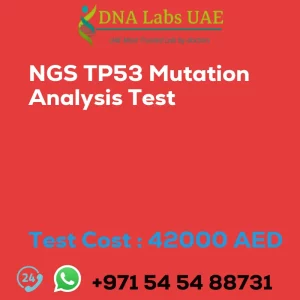PDGFR and cKIT Gastrointestinal Stromal Tumors Test
At DNA Labs UAE, we offer the PDGFR and cKIT Gastrointestinal Stromal Tumors Test to help diagnose and manage gastrointestinal stromal tumors (GISTs). This test is available for a cost of 3000.0 AED.
Test Details
The PDGFR and cKIT Gastrointestinal Stromal Tumors Test focuses on the analysis of paraffin embedded tissue blocks. It utilizes Sanger Sequencing, a method commonly used in genetics testing, to identify any mutations in the PDGFR and cKIT genes. These genes are receptor tyrosine kinases that are crucial for cell development and function.
Pre Test Information
In order to undergo the PDGFR and cKIT Gastrointestinal Stromal Tumors Test, a doctor’s prescription is required. However, please note that this test is not applicable for individuals who are planning surgery, are pregnant, or have plans to travel abroad.
Test Process and Report Delivery
Once the tumor tissue sample is obtained, the test will be performed, and the report will be delivered within 7-8 days.
Role of PDGFR and cKIT in GISTs
Gastrointestinal stromal tumors (GISTs) are a type of cancer that originates in the gastrointestinal tract. Mutations in the PDGFR and cKIT genes are commonly found in GISTs. In normal cells, these genes help regulate cell growth, division, and survival. However, when mutations occur, the receptors become overactive, leading to uncontrolled cell proliferation and tumor formation.
Treatment Options
Targeting PDGFR and cKIT has proven to be an effective therapeutic strategy for GISTs. Imatinib mesylate (Gleevec) is a tyrosine kinase inhibitor that specifically targets both PDGFR and cKIT. By inhibiting the activity of these receptors, imatinib can block the signaling pathways that promote tumor growth and survival. Imatinib has revolutionized the treatment of GISTs and is considered the standard first-line therapy for advanced or metastatic disease.
However, it is important to note that not all GISTs respond to imatinib, and resistance to the drug can develop over time. In such cases, other targeted therapies, such as sunitinib or regorafenib, may be used to overcome resistance and further inhibit the activity of PDGFR and cKIT.
Ongoing Research
Research in the field of GISTs is ongoing, with a focus on developing new therapies and strategies to overcome resistance and improve outcomes for patients. The discovery of PDGFR and cKIT as key drivers of GISTs has paved the way for targeted treatments and has significantly impacted the management of this disease.
In conclusion, the PDGFR and cKIT Gastrointestinal Stromal Tumors Test offered by DNA Labs UAE is an essential tool for the diagnosis and management of GISTs. By identifying mutations in these genes, doctors can determine the most appropriate treatment options for patients, including the use of targeted therapies such as imatinib. This test plays a crucial role in improving patient outcomes and advancing research in the field of GISTs.
| Test Name | PDGFR and cKIT Gastrointestinal Stromal Tumors Test |
|---|---|
| Components | Paraffin embedded tissue blocks |
| Price | 3000.0 AED |
| Sample Condition | Tumor tissue |
| Report Delivery | 7-8 days |
| Method | Sanger Sequencing |
| Test type | Genetics |
| Doctor | Gynecologist |
| Test Department: | |
| Pre Test Information | PDGFR + cKIT (Gastrointestinal Stromal Tumors) can be done with a Doctors prescription. Prescription is not applicable for surgery and pregnancy cases or people planing to travel abroad. |
| Test Details |
PDGFR and cKIT are both receptor tyrosine kinases that play a critical role in the development and function of cells. Mutations in these genes have been found to be common in gastrointestinal stromal tumors (GISTs), a type of cancer that originates in the gastrointestinal tract. In normal cells, PDGFR and cKIT help regulate cell growth, division, and survival. However, when mutations occur in these genes, the receptors become constitutively activated, leading to uncontrolled cell proliferation and tumor formation. Targeting PDGFR and cKIT has proven to be an effective therapeutic strategy for GISTs. Imatinib mesylate (Gleevec) is a tyrosine kinase inhibitor that specifically targets both PDGFR and cKIT. By inhibiting the activity of these receptors, imatinib can block the signaling pathways that promote tumor growth and survival. Imatinib has revolutionized the treatment of GISTs and has become the standard first-line therapy for patients with advanced or metastatic disease. However, not all GISTs respond to imatinib, and resistance to the drug can develop over time. In such cases, other targeted therapies, such as sunitinib or regorafenib, may be used to overcome resistance and further inhibit the activity of PDGFR and cKIT. In conclusion, PDGFR and cKIT are key drivers of gastrointestinal stromal tumors, and targeting these receptors with tyrosine kinase inhibitors has revolutionized the treatment of GISTs. Ongoing research is focused on developing new therapies and strategies to overcome resistance and improve outcomes for patients with this disease. |








